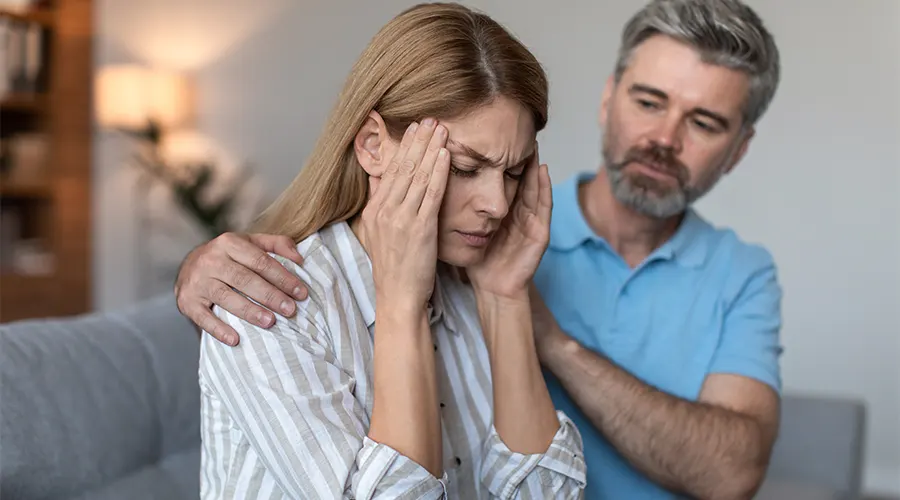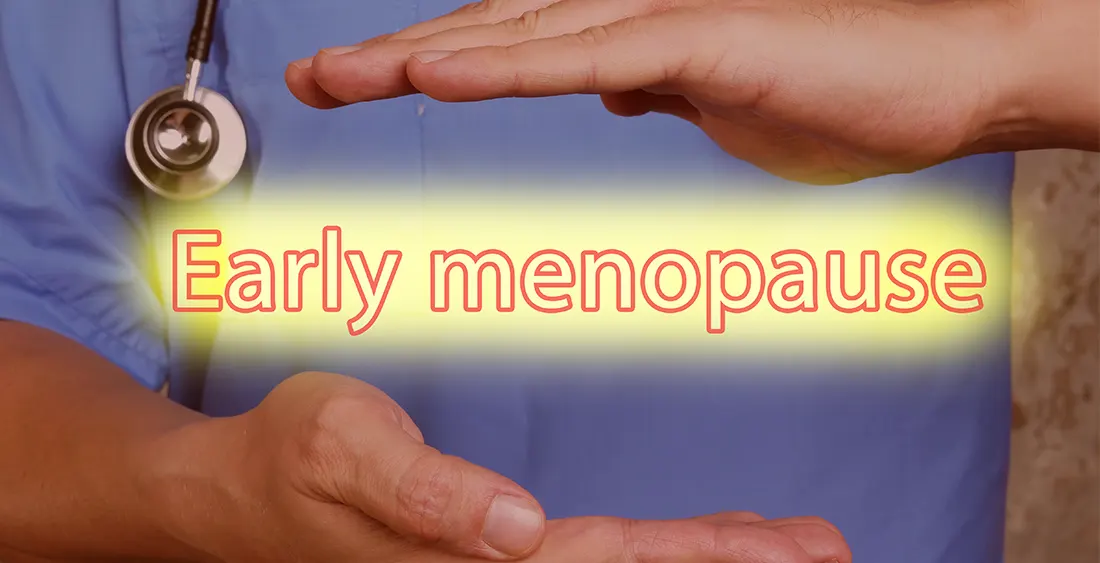What is Early Menopause?
Early menopause is defined as the permanent cessation of menstrual cycles before age 45. Other than typical menopause, which generally happens in the early 50s, early menopause symptoms can have a strong impact on the physical and emotional well-being of a person because of their time of onset.
It may result from natural biological changes or be caused by external factors such as medical treatments and lifestyle habits. Understanding early menopause helps identify the signs and thus seek treatment in time.
In the case of many women, early menopause age can be as early as the mid-to-late 30s. Being able to identify the signs of early menopause at age 35 is essential since they often occur together with symptoms from other diseases, such as hormonal imbalance or POI.
While the effects of POI still allow occasional ovulation and, therefore, some possibility of pregnancy, what triggers early menopause brings menstruation to an absolute end, and complete infertility is assured.
Signs and Symptoms of Early Menopause
Knowledge of early menopause symptoms helps people identify or improve this status. Below are the common symptoms:
- Irregular Periods: This is always one of the first and easiest early menopause signs to identify by women who are experiencing the situation. The menstrual cycle may even reduce significantly in length increase or disappear completely. Some women might not have periods for a month or two, while others might have more than normal bleeding during others.
- Hot Flashes and Night Sweats: Hot flashes are perhaps the most famous symptoms of early menopause, which interrupt periods and are characterized by sudden attacks of heat and red cheeks accompanied by sweating. Hearing is unfortunate, and night sweats further aggravate tiredness by interrupting sleep.
- Mood Changes: Hormonal changes make a woman moody, irritable, anxious, and or depressed. These changes occur in the affected female, and the emotional may alter relationships and overall mental health; therefore, it’s important to notice when early menopause begins.
- Sleep Disturbances: Sleeping with or without insomnia is also a prevalent problem. Menopause with cow’s night sweats can result in persistent night drenching and hormonal changes that cause chronic insomnia, fatigue, and poor concentration during the day.
- Vaginal Dryness and Discomfort: Smaller amounts of estrogen cause the walls of the vagina to become thin and dry and intercourse becomes painful, and women are more prone to developing urinary tract infections (UTI).
- Decreased Libido: It appears that erectile dysfunction is not uncommon during this pregnancy period because many women complain about the decrease in sexual desire, which hormonal fluctuations, physical discomfort, and unstable mood may cause.
- Cognitive Changes: For example, “brain fog,” forgetting things, and poor concentration are normal during early menopause. These cognitive challenges, often referred to as Menopause Brain Fog, can interfere with daily life and work responsibilities.
- Physical Changes: There are others, however, including hair loss, brittle nails, skin dryness, additional body fat, and aching bones and muscles. They all usually occur abruptly and, many times, are likely to cause distressing effects to the affected persons.
Natural support for hot flashes, mood swings, and more. Order Menocil today!
Causes of Early Menopause
- Genetics: The presence of early menopause in your family means that it may also crash on you because the causes of early menopause run in the family.
- Medical Treatments: Chemotherapy, radiation or operations such as oophorectomy cause early shrinkage of the ovaries.
- Lifestyle Factors: Smoking has been linked to early ovarian aging, so the earlier the age to reach early menopause age.
- Autoimmune Disorders: They may attack ovarian tissue and disrupt hormones; other diseases and inflammation, such as rheumatoid arthritis.
- Hormonal Imbalances: Disorders of estrogen are also a cause of what may be referred to as early menopause.
How Early Menopause Affects Your Health
Experiencing early menopause symptoms can have long-term health effects and impact daily life. Below are some key ways it affects health:
- Osteoporosis: Decreased levels of estrogen generally lead to a rapid depletion of bone density, thereby leading to fractures and osteoporosis. Early menopause-aged women are prone to develop weak bone density.
- Heart Disease: Estrogen is a risk factor for cardiovascular disease. Estrafenan, which occurs during what might be regarded as early menopause, will cause a loss of estrogen and may contribute to high blood pressure, heart attacks, or other cardiovascular problems.
- Mental Health: Fluctuations in hormones cause changes in mood swings, anxiety, and depression that are apparent in the early stages of menopausal years. Emotional health issues often affect an individual’s social and occupational interactions. Learn more about the connection between fluctuating hormones and emotional health in this comprehensive article on Menopause and Depression.
- Fertility Loss: It is most unfortunate that many of the things that cause early menopause carry with them the loss of fertility. This is can be difficult, especially for those who active in conception, because natural conception may be difficult to come by.
Manage early menopause symptoms naturally with Menocil. Start today!
Managing Early Menopause: Tips and Lifestyle Changes
- Healthy Diet: Take foods that contain calcium, vitamin D, and magnesium to suppress this common disease known as osteoporosis in early menopausal moments.
- Regular Exercise: Exercise puts weight on bones and helps combat some early menopausal symptoms that include hormonal fluctuations affecting moods.
- Stress Reduction: Mindfulness, meditation, and yoga decrease hot flashes, anxiety, and other symptoms.
- Adequate Sleep: Several early menopause symptoms, such as insomnia, can be managed by following a relaxing sleep schedule at night.
- Emotional Well-being: Group and counseling assist in dealing with Psycho-social illnesses related to early menopause age.
Treatment for Early Menopause
Hormone Replacement Therapy (HRT): HRT is probably one of the best regimens for handling symptomatic postmenopausal complaints, including flashes and bone density. It substitutes depleted estrogen and progesterone. It is, however, crucial to have a word with a doctor regarding the possibilities and the dangers involved in such a prognosis.
Non-Hormonal Medications: SSRIs or gabapentin can reduce hot flashes and mood swings without hormones having to be used to treat them.
Supplements: Calcium, vitamin D, and omega-3 fatty acids are great for bone and cardiovascular health. Many women use natural treatments, such as black cohosh, for the mild signs but with the doctor’s permission.
Alternative Therapies: A variety of practices, including acupuncture, aromatherapy, and yoga, may enhance general health and lessen stress related to what is early menopause.
Say yes to better days during menopause. Try Menocil now for effective support.
The Impact of Early Menopause on Relationships and Family Life
 Impact of Early Menopause on Relationships
Impact of Early Menopause on Relationships Symptoms of early menopause strain the personal relationships that one has, especially intimacy. Mood swings, reduced libido, and dryness in the vagina strain emotional and physical closeness. Open communications between partners are very helpful in such situations. Feelings should be discussed openly to reduce misunderstandings and allow mutual support.
Family background is also very important. Knowledge of early menopause and patience will help an individual navigate this transition with resilience.
Fertility and Early Menopause: What You Need to Know
With early menopause age, one is bound to have more fertility concerns since the ovulation stops much earlier. Women who want to get pregnant may look into options such as egg freezing before menopause, using donor eggs, or IVF. Surrogacy and adoption also offer other ways to become a parent. Consulting with a fertility specialist early is important to create an individualized plan.
Conclusion: Navigating Early Menopause
Early menopause is the biggest change in life, but with proper knowledge and support, it can be managed accordingly.
You will live a healthy and fulfilling life if you know what early menopause is, recognize its symptoms, and explore options for treatment.
You may discuss the treatments or supplements that best suit you with your healthcare provider and lean on your loved ones for emotional support. Keep in mind that you are never alone.

